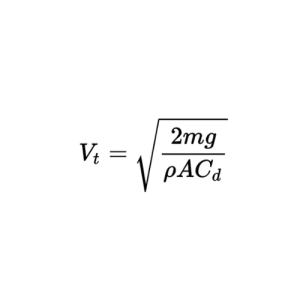
A falling object toward the earth falls with an acceleration of 9.81 m/s² or 32.18 ft/s². The “drag force” that resists motion is approximately proportional to the square of its velocity but at low velocity the drag is less than gravitational force hence the object accelerates. The drag increases as it accelerates until at last it equals the weight. Drag is also dependant on the projected area.
Mathematically, terminal velocity without considering the buoyancy effects is given by

Notes on Terminal Velocity
where
Vt = terminal velocity,
m = mass of the falling object,
g = acceleration due to gravity,
Cd = drag coefficient,
ρ = density of the fluid through which the object is falling, and
A = projected area of the object.
